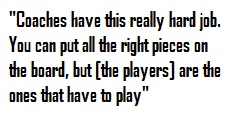 Professor Ryan Bergeron has been a lecturer of Computer Science since Spring 2008. Currently the Technical Director for UMBC's Women's Volleyball team, Bergeron's research interests lie at the intersection of athletics and technology.
Professor Ryan Bergeron has been a lecturer of Computer Science since Spring 2008. Currently the Technical Director for UMBC's Women's Volleyball team, Bergeron's research interests lie at the intersection of athletics and technology.
Among his colleagues, Professor Ryan Bergeron has one distinct teaching advantage: he can relate to students studying Computer Science at UMBC because at one point he was a student studying Computer Science at UMBC. “I am a UMBC alumni all the way,” says Bergeron who put his high-school aspirations to become an art major aside to study Computer Science. “It was just something that came easy,” he says of programming, which appealed to his inherent love of solving problems.
After graduating in 2004, Bergeron pursued a Master’s degree at UMBC, where he studied Data Visualization under Dr. Penny Rheingans as part of the VanGogh Lab. Bergeron’s first taste of teaching was as a Teaching Assistant for Professor Dennis Frey’s Computer Science 202 course. Though he admits the primary draw of the position was financial help, rather than a deep-seated desire for teaching, something clicked. “I loved being a teaching assistant,” says Bergeron, “I got to see the other side of the curtain.”
While pursuing his Master’s in Computer Science, Bergeron found a way to tie in his other love: Volleyball. “Coaches have this really hard job. You can put all the right pieces on the board, but [the players] are the ones that have to play,” says Bergeron, “It’s not like you can actually gauge how well they play together.” So, for his Master’s thesis, Bergeron decided to develop a program for visualizing team dynamics. And then he applied it—successfully– to the team he was coaching: UMBC’s Women’s Volleyball.
As a student, Bergeron played club volleyball, but, when bad knees got the best of him, he decided to give coaching a shot. Now, the Technical Director for UMBC’s Women’s Volleyball Team, Bergeron says he loves the competitive draw of coaching. “It’s a different kind of teaching,” says Bergeron, because the court is what he refers to as a “totally invested environment.” He’s a strong advocate of his players. “We have a really good team,” says Bergeron, “They’re very, very successful.” And, they’re smart too, he says.
 Bergeron rattles off the accomplishments of team members like a proud father—one alumna just finished medical school, another is a nurse, and a current senior just secured a fellowship from the University of North Carolina at Chapel Hill School of Dentistry. A self-proclaimed advocate of athletes, he believes that they are underestimated by most faculty members. “Not only do they have to maintain a full course load…but they also have to have three hours of practice a day,” says Bergeron, “It’s ridiculous that more people don’t support what they’re trying to do.” He explains that the “jock” stereotype perpetuated by society paints athletes as unintelligent, when really, they’re just a different kind of smart. “I’m pretty sure that I couldn’t throw a football eighty yards and I couldn’t make the decisions they have to make while they’re playing,” he explains.
Bergeron rattles off the accomplishments of team members like a proud father—one alumna just finished medical school, another is a nurse, and a current senior just secured a fellowship from the University of North Carolina at Chapel Hill School of Dentistry. A self-proclaimed advocate of athletes, he believes that they are underestimated by most faculty members. “Not only do they have to maintain a full course load…but they also have to have three hours of practice a day,” says Bergeron, “It’s ridiculous that more people don’t support what they’re trying to do.” He explains that the “jock” stereotype perpetuated by society paints athletes as unintelligent, when really, they’re just a different kind of smart. “I’m pretty sure that I couldn’t throw a football eighty yards and I couldn’t make the decisions they have to make while they’re playing,” he explains.
This is why, although he enjoys developing iPhone applications (he’s got a “Risk” game in the works) and has a keen interest in video game development (he was a video game tester his junior year of college), Bergeron’s real research interest is at the intersection of athletics and technology. “It’s a completely untapped area of research,” he says. Questions like “How do I make coaches understand what their players are doing better” and “How can we make athletes even better at what they do” are at the heart of his search. He uses the example of how Baltimore Ravens’ quarterback Joe Flacco uses an iPad application that goes through play footage step-by-step in order to learn his trade better. And, not only can technology help athletes improve, but “It’s a crucial tool to help people that are non-athletes to understand sports as well,” says Bergeron.
Since he joined the CSEE faculty as a lecturer in the Spring of 2008, Bergeron has been teaching introductory computer science classes—his favorite being CMSC 341: Data Structures. His favorite thing about teaching, he says, is actually “getting up and teaching.” Like computer programming, teaching, he explains, is problem solving. Plus, Bergeron sees parallels with his other role on campus. Whether on the court or the classroom, he holds the strong conviction that competition equals success: “I think competition really helps motivate people to really go that extra mile.”